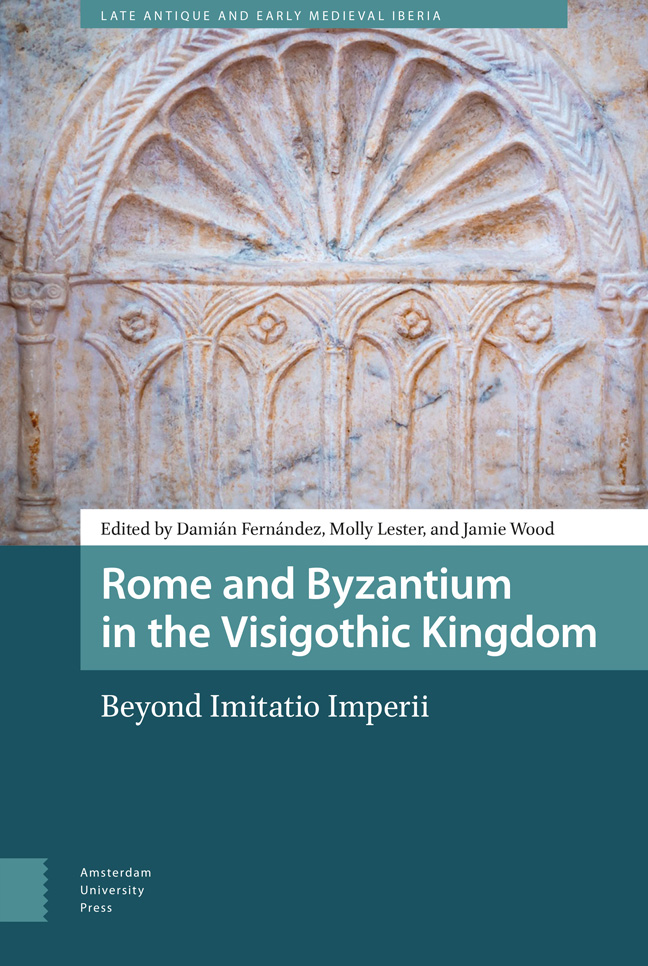Book contents
- Frontmatter
- Contents
- List of Figures and Tables
- Abbreviations
- Acknowledgements
- Maps
- Introduction
- 1 Visigothic Spain and Byzantium: The Story of a Special (Historiographical) Relationship
- 2 The Development of the Visigothic Court in the Hagiography of the Fifth and Sixth Centuries
- 3 Experiments in Visigothic Rulership: Minting and Monetary Reforms under Alaric II
- 4 A Comparison of Roman and Visigothic Approaches to Exile
- 5 The Roman Jewel in the Visigothic Crown: A Reassessment of the Royal Votive Crowns of the Guarrazar Treasure
- 6 Capitalhood in the Visigothic Kingdom
- 7 Making Rite Choices: Roman and Eastern Liturgies in Early Medieval Iberia
- 8 Ethnicity and Imitatio in Isidore of Seville
- 9 Re-imagining Roman Persecution in the Visigothic Passions
- 10 Romanness in Visigothic Hagiography
- 11 Empire and the Politics of Faction: Mérida and Toledo Revisited
- 12 The Agents and Mechanics of Connectivity: The Mediterranean World and the Cities of the Guadiana Valley in the Sixth Century
- 13 Staying Roman after 711?
- Index
3 - Experiments in Visigothic Rulership: Minting and Monetary Reforms under Alaric II
Published online by Cambridge University Press: 20 February 2024
- Frontmatter
- Contents
- List of Figures and Tables
- Abbreviations
- Acknowledgements
- Maps
- Introduction
- 1 Visigothic Spain and Byzantium: The Story of a Special (Historiographical) Relationship
- 2 The Development of the Visigothic Court in the Hagiography of the Fifth and Sixth Centuries
- 3 Experiments in Visigothic Rulership: Minting and Monetary Reforms under Alaric II
- 4 A Comparison of Roman and Visigothic Approaches to Exile
- 5 The Roman Jewel in the Visigothic Crown: A Reassessment of the Royal Votive Crowns of the Guarrazar Treasure
- 6 Capitalhood in the Visigothic Kingdom
- 7 Making Rite Choices: Roman and Eastern Liturgies in Early Medieval Iberia
- 8 Ethnicity and Imitatio in Isidore of Seville
- 9 Re-imagining Roman Persecution in the Visigothic Passions
- 10 Romanness in Visigothic Hagiography
- 11 Empire and the Politics of Faction: Mérida and Toledo Revisited
- 12 The Agents and Mechanics of Connectivity: The Mediterranean World and the Cities of the Guadiana Valley in the Sixth Century
- 13 Staying Roman after 711?
- Index
Summary
Abstract
Analyses of coinage from the post-Roman West tend to assume a steady decline from idealized late Roman appearance and use. This article explores the early Visigothic state to understand how coinage and monetary policy were transforming. It first investigates features of the first two types of post-Roman Visigothic coins—imitative (418–507 CE) and pseudo-imperial (507–570s CE)—to suggest that they should be understood as responses to local changes in governance alongside changes to broader Mediterranean trajectories. It then compares the ‘interpretations’ added to the Breviary of Alaric that modified laws on coins in the Theodosian Code to argue that these changes helped shape both the appearance and use of money in the Visigothic world and were thus a means of transforming governance in the post-Roman West.
Keywords: economy; monetary policy; coinage; Visigothic coins; Theodosian Code; Breviary of Alaric
Introduction
Around the year 508 CE, Bishop Avitus of Vienne wrote to his brother Bishop Apollinaris of Valence asking for a gold monogrammed ring, whose features he described in detail. He asked Apollinaris to ensure that the ring was not made from a ‘corrupted mixture of gold’ that was of the same debased metal content that the ‘King of the Visigoths had commanded to the public mint’. Avitus's letter offers a tantalizing hint that this Visigothic ruler, Alaric II (r. 484–507 CE), was reducing the fineness of his gold, which people including Avitus had noticed. A clause in the Burgundian law code, the Liber Constitutionum issued around a decade after Avitus's letter, corroborates that Alaric had apparently minted adulterated coinage, since the clause banned coins that ‘had been debased at the time of king Alaric’. Several other stories about the last few years of Alaric's reign discuss Visigothic money as well. The Chronicle of Fredegar, for example, recounts that Alaric II owed tribute to the ruler of the Merovingians, Clovis (d. 511). Alaric was required to pay Clovis the amount of gold required to cover a mounted Merovingian envoy and his spear. When Alaric could not fulfil this impossible demand, conflict broke out between the two rulers, with Clovis eventually victorious. Likewise, both Gregory of Tours and Procopius of Caesarea explicitly mention that Clovis carried off Alaric's treasure at the end of the conflict.
- Type
- Chapter
- Information
- Rome and Byzantium in the Visigothic KingdomBeyond Imitatio Imperii, pp. 73 - 96Publisher: Amsterdam University PressPrint publication year: 2023

